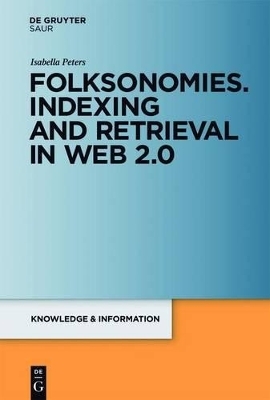
Folksonomies. Indexing and Retrieval in Web 2.0
Seiten
| Ausstattung: Hardcover & eBook
2009
De Gruyter
978-3-11-174104-8 (ISBN)
De Gruyter
978-3-11-174104-8 (ISBN)
- Titel leider nicht mehr lieferbar
- Artikel merken
In Web 2.0 users not only make heavy use of Col-laborative Information Services in order to create, publish and share digital information resources - what is more, they index and represent these re-sources via own keywords, so-called tags. The sum of this user-generated metadata of a Collaborative Information Service is also called Folksonomy. In contrast to professionally created and highly struc-tured metadata, e.g. subject headings, thesauri, clas-sification systems or ontologies, which are applied in libraries, corporate information architectures or commercial databases and which were developed according to defined standards, tags can be freely chosen by users and attached to any information resource. As one type of metadata Folksonomies provide access to information resources and serve users as retrieval tool in order to retrieve own re-sources as well as to find data of other users. The book delivers insights into typical applications of Folksonomies, especially within Collaborative Information Services, and discusses the strengths and weaknesses of Folksonomies as tools of knowl-edge representation and information retrieval. More-over, it aims at providing conceptual considerations for solving problems of Folksonomies and presents how established methods of knowledge representa-tion and models of information retrieval can successfully be transferred to them. Kollaborative Informationsdienste im Web 2.0 werden von den Internetnutzern nicht nur dazu genutzt, digitale Informationsressourcen zu produzieren, sondern auch, um sie inhaltlich mit eigenen Schlagworten, sog. Tags, zu erschließen. Dabei müssen die Nutzer nicht wie bei Bibliothekskatalogen auf Regeln achten. Die Menge an nutzergenerierten Tags innerhalb eines Kollaborativen Informationsdienstes wird als Folksonomy bezeichnet. Die Folksonomies dienen den Nutzern zum Wiederauffinden eigener Ressourcen und für die Recherche nach fremden Ressourcen. Das Buch beschäftigt sich mit Kollaborativen Informationsdiensten, Folksonomies als Methode der Wissensrepräsentation und als Werkzeug des Information Retrievals. Pluspunkte In der Forschung und im Web 2.0 stark diskutiertes Thema Einzige systematische Aufbereitung aus informationswissenschaftlicher Sicht und ganzheitliche Betrachtung der Folksonomies als Methode der Wissensrepräsentation und des Information Retrievals Grundlagenwerk für Folksonomies
Isabella Peters, Heinrich-Heine-Universität, Düsseldorf
| Zusatzinfo | Includes a print version and an ebook |
|---|---|
| Verlagsort | Berlin |
| Sprache | englisch |
| Maße | 155 x 230 mm |
| Themenwelt | Sozialwissenschaften ► Kommunikation / Medien ► Buchhandel / Bibliothekswesen |
| Schlagworte | Allgemein • Books & Reading • General • Indexierung • Information Retrieval • Information retrieval / Social aspects • Kataloganreicherung • Libraries and Library Science • Library and Information Science, Book Studies • Literary criticism • Social Tagging • User-generated content • User generated Content • Web 2.0 • Web 2.0 / Social aspects • Web sites • Web sites / Abstracting and indexing / Social aspects • Wissensorganisation • Wissensrepräsentation • World Wide Web 2.0 |
| ISBN-10 | 3-11-174104-4 / 3111741044 |
| ISBN-13 | 978-3-11-174104-8 / 9783111741048 |
| Zustand | Neuware |
| Haben Sie eine Frage zum Produkt? |